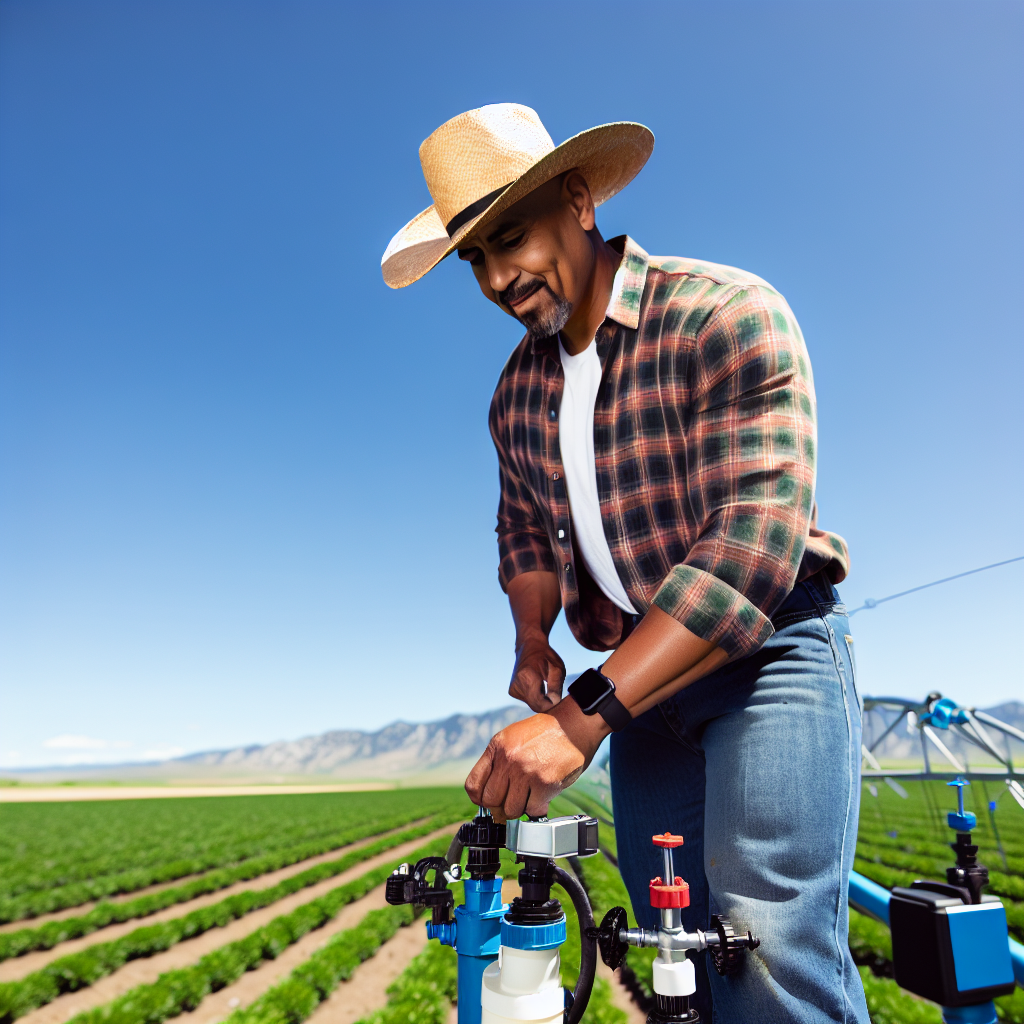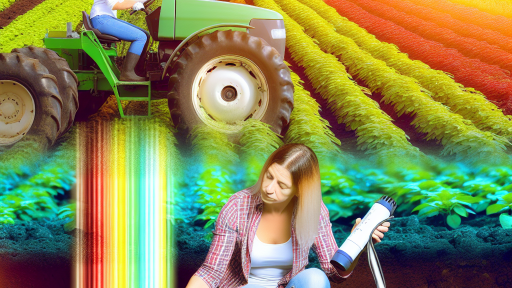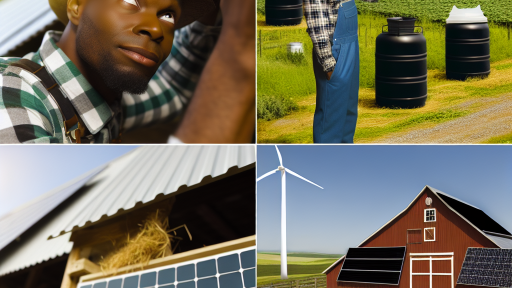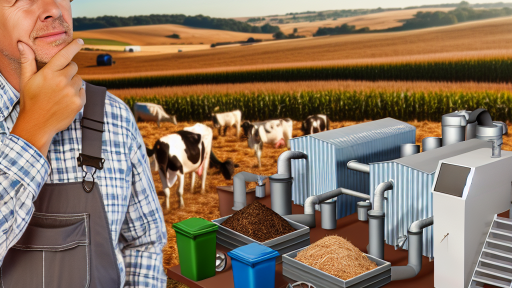Introduction to Precision Irrigation
Definition of Precision Irrigation
Precision irrigation refers to the use of advanced technologies in water management.
This approach optimizes water use for crop production.
It combines data collection, automated systems, and real-time monitoring.
As a result, farmers can apply water more accurately and efficiently.
Importance of Precision Irrigation
Precision irrigation plays a crucial role in modern agriculture.
It significantly reduces water wastage and conserves resources.
Moreover, it enhances crop yields through tailored water application.
The practice also supports sustainable farming initiatives.
Benefits of Precision Irrigation Systems
These systems offer multiple advantages to farmers.
- They minimize overwatering and underwatering issues.
- Farmers can achieve higher efficiency in water usage.
- Adoption leads to better soil health and reduced erosion.
- Crops receive the exact amount of water they need.
Technologies in Precision Irrigation
Several technologies underpin precision irrigation systems.
- Soil moisture sensors provide real-time data on soil conditions.
- Drip irrigation delivers water directly to the plant roots.
- Automated irrigation controllers adjust water levels based on weather forecasts.
- Drones can assess crop health and identify irrigation needs.
Challenges in Implementing Precision Irrigation
Despite its benefits, some challenges exist in implementation.
Initial costs for technology can be high for many farmers.
Moreover, training is essential to utilize these systems effectively.
Farmers may also face technical issues with equipment.
Types of Precision Irrigation Systems
Drip Irrigation
Drip irrigation delivers water directly to plant roots.
Transform Your Agribusiness
Unlock your farm's potential with expert advice tailored to your needs. Get actionable steps that drive real results.
Get StartedThis method minimizes water loss due to evaporation.
It improves crop yield by providing consistent moisture.
Farmers can install it in various configurations.
Additionally, it reduces labor costs significantly.
Technological Advances in Precision Irrigation
Sensors in Precision Irrigation
Sensors play a crucial role in modern irrigation systems.
They provide real-time data on soil moisture levels.
Additionally, sensors can monitor temperature and humidity.
Advanced sensors increase irrigation efficiency significantly.
Farmers can install soil moisture sensors throughout their fields.
These sensors help farmers determine when to irrigate crops.
Moreover, they reduce water wastage by optimizing usage.
For instance, the Soil Moisture Sensor Company produces highly reliable devices.
These devices are easy to integrate into existing irrigation systems.
As a result, farmers can make informed irrigation decisions.
Automation in Irrigation Systems
Automation enhances the effectiveness of precision irrigation.
Automated systems can adjust water delivery based on sensor data.
This system operates automatically, minimizing manual intervention.
Moreover, automated irrigation reduces labor costs significantly.
Farmers using automated systems often observe increased crop yields.
For example, AgriBot Solutions specializes in automated irrigation technologies.
Their systems can be customized to suit different crop types.
Furthermore, farmers can remotely control automated systems via apps.
This flexibility allows for immediate adjustments during changing conditions.
Ultimately, automation saves time and resources for modern farmers.
Showcase Your Farming Business
Publish your professional farming services profile on our blog for a one-time fee of $200 and reach a dedicated audience of farmers and agribusiness owners.
Publish Your ProfileIntegration of AI and Data Analytics
Artificial intelligence (AI) complements precision irrigation effectively.
AI algorithms can analyze data from various sources.
They assist in predicting crop water requirements accurately.
Additionally, data analytics enhances decision-making processes.
Farmers gain insights to improve overall irrigation strategies.
Companies like SmartFarm Analytics provide such AI-driven solutions.
The use of AI leads to smarter, more sustainable irrigation practices.
As a result, it increases water conservation efforts significantly.
The future of farming lies in data-driven irrigation solutions.
By leveraging technology, farmers can ensure optimal resource utilization.
Find Out More: Reducing Carbon Footprint with Sequestration in Agriculture
Benefits of Precision Irrigation
Water Conservation
Precision irrigation systems play a crucial role in water conservation.
They reduce water waste significantly compared to traditional methods.
Farmers can apply water only when and where it is needed.
This targeted approach minimizes runoff and evaporation.
As a result, farms can maintain sustainable water resources.
Moreover, these systems help in optimizing irrigation schedules.
By using real-time data, farmers can adjust their practices effectively.
This aspect ensures that crops receive adequate moisture levels.
Ultimately, precision irrigation enhances overall water management.
Crop Yield Improvement
In addition to conserving water, precision irrigation boosts crop yields.
It allows for precise control over watering conditions.
This promotes healthier plants and better growth rates.
Additionally, farmers can monitor soil moisture closely.
As a result, they make informed decisions about irrigation timing.
This can lead to more productive harvests and higher quality crops.
Furthermore, precision systems can help reduce pest and disease pressures.
By maintaining optimal growing conditions, crop resilience increases.
Farmers experience both economic and environmental benefits.
See Related Content: Effective Carbon Sequestration Methods for Farms
Challenges and Barriers to Implementing Precision Irrigation in Modern Farms
High Initial Investment Costs
Implementing precision irrigation systems requires significant initial investment.
Farmers must purchase advanced equipment and technology.
This upfront cost can deter many from adopting precision irrigation.
Additionally, installation expenses may add to the burden.
Many farmers struggle to secure financing for these investments.
Lack of Technical Knowledge
Farmers often lack the necessary technical expertise for implementation.
Understanding complex systems requires training and education.
Furthermore, there may be a knowledge gap in the local farming community.
This can create apprehension towards adopting new methods.
Training programs are essential to bridge this gap.
Showcase Your Farming Business
Publish your professional farming services profile on our blog for a one-time fee of $200 and reach a dedicated audience of farmers and agribusiness owners.
Publish Your ProfileLimited Access to Local Support Services
Farmers frequently face challenges finding local support services.
Access to maintenance and troubleshooting resources is crucial.
Without local support, farmers may struggle to resolve system issues.
This lack of assistance can hinder successful implementation.
Improving local infrastructure can address this concern.
Data Management Concerns
Precision irrigation relies heavily on data collection and analysis.
Farmers may lack the tools to effectively manage this data.
Moreover, data privacy concerns can discourage adoption.
Safeguarding sensitive information is paramount for user trust.
Promoting data management training can alleviate these fears.
Uncertainty About Long-Term Benefits
Farmers often question the long-term benefits of precision irrigation.
They may be uncertain if the promised efficiencies will materialize.
This skepticism can lead to hesitation in investment decisions.
Demonstrating successful case studies can help mitigate concerns.
Farmers need assurance of a return on their investments.
See Related Content: Benefits of Crop Rotation and Diversity in Farming

Case Studies: Success Stories of Precision Irrigation Implementation
River Valley Farms
River Valley Farms successfully implemented precision irrigation technology last year.
This innovative approach significantly reduced water consumption.
They utilized soil moisture sensors to determine optimal watering times.
Consequently, their crop yields increased by 20% in the first season.
GreenField Agriculture
GreenField Agriculture adopted a centralized irrigation management system.
This allowed for real-time monitoring and adjustments of water delivery.
They reported a 30% decrease in water usage within six months.
This success demonstrates the effectiveness of technological integration in farming.
Sunny Acres Vineyard
Sunny Acres Vineyard integrated drip irrigation systems for their grape crops.
This method minimized water waste while enhancing nutrient delivery.
As a result, they experienced a marked improvement in grape quality.
Customer satisfaction ratings rose significantly after this change.
Harvest Moon Organics
Harvest Moon Organics focused on soil health alongside precision irrigation.
They employed cover cropping techniques to improve water retention.
Ultimately, their precision irrigation system complemented their sustainable practices.
The farm achieved remarkable growth in both profitability and environmental stewardship.
Highland Farms
Highland Farms installed a solar-powered irrigation system.
This eco-friendly method reduced both costs and fossil fuel dependency.
Farmers noted improved efficiency and sustainability in their operations.
Additionally, this initiative received recognition from local environmental groups.
Spring River Orchards
Spring River Orchards applied variable rate irrigation based on crop needs.
This customization led to substantial water conservation.
Moreover, their diverse fruit selection benefited from targeted watering strategies.
The farm reported increased fruit quality and lower production costs.
Showcase Your Farming Business
Publish your professional farming services profile on our blog for a one-time fee of $200 and reach a dedicated audience of farmers and agribusiness owners.
Publish Your ProfileSee Related Content: Expert Pest Control Services in El Paso by Hirby Pest Control Since 1974
Cost-Benefit Analysis of Precision Irrigation for Different Types of Farms
Introduction to Precision Irrigation
Precision irrigation improves water efficiency on farms.
This technology uses data analytics and real-time monitoring.
Farmers aim to enhance crop yield while minimizing resource waste.
Analyzing costs and benefits helps farmers make informed decisions.
Cost Considerations for Different Farms
The initial investment varies based on farm size and type.
Small farms often face higher relative costs.
However, technological advancements continue to lower prices.
Consequently, larger operations benefit from economies of scale.
- Drip irrigation systems might require significant upfront costs.
- Sprinkler systems can offer less expensive alternatives.
- Maintenance and operational costs also play a crucial role.
Benefits of Precision Irrigation
Farmers experience several key benefits from these systems.
Increased water efficiency leads to higher crop productivity.
Moreover, reduced water waste improves sustainability.
Additionally, precision technology provides valuable data insights.
- Farmers can adjust irrigation schedules based on soil moisture.
- They can target specific areas needing more water.
- This approach reduces labor costs and time.
Comparison Across Farm Types
Different farm types experience unique outcomes with precision irrigation.
Crops like fruits and vegetables often benefit the most.
These crops are sensitive to water variations and directly tied to yield.
Similarly, row crops, such as corn and soybeans, also see gains.
Long-Term Financial Gains
While upfront costs can be daunting, long-term savings emerge.
Farmers reduce their water bills with efficient systems.
Moreover, they achieve increased yields that exceed initial investments.
In many cases, farmers report a return on investment within a few seasons.
Case Study Insights
Farmers like Marcus Green have adopted precision irrigation.
His organic vegetable farm reduced water usage by 30% annually.
This leads to significant cost savings and enhanced productivity.
Furthermore, such success stories encourage others to adopt similar technologies.
Future Trends in Precision Irrigation
Innovative Technologies
Precision irrigation systems employ advanced technologies to enhance efficiency.
For instance, soil moisture sensors offer real-time data to farmers.
This data enables targeted watering based on crop needs.
Moreover, AI and machine learning optimally schedule irrigation tasks.
These innovations reduce water usage and increase yields.
Integration of Internet of Things
The Internet of Things (IoT) plays a crucial role in precision irrigation.
Smart devices collect and transmit data across large areas.
Farmers can monitor irrigation systems remotely, improving responsiveness.
This integration enhances decision-making in water management.
Sustainability in Water Usage
Sustainability is a key focus in future irrigation practices.
Aim to reduce water waste by utilizing efficient technologies.
Drip irrigation systems target water directly to the root zone.
Consequently, this method conserves water while supporting plant health.
Adoption of Drones
Drones increasingly assist in monitoring irrigation needs.
They provide aerial views to assess crop health and moisture levels.
Showcase Your Farming Business
Publish your professional farming services profile on our blog for a one-time fee of $200 and reach a dedicated audience of farmers and agribusiness owners.
Publish Your ProfileFurthermore, drones can identify areas requiring additional attention.
This technology fosters timely interventions that improve productivity.
Regulatory and Policy Support
Governments actively promote precision irrigation practices through incentives.
These policies encourage farmers to adopt sustainable technologies.
In addition, funding opportunities enable research and development.
Such support fosters innovation across the agricultural sector.




